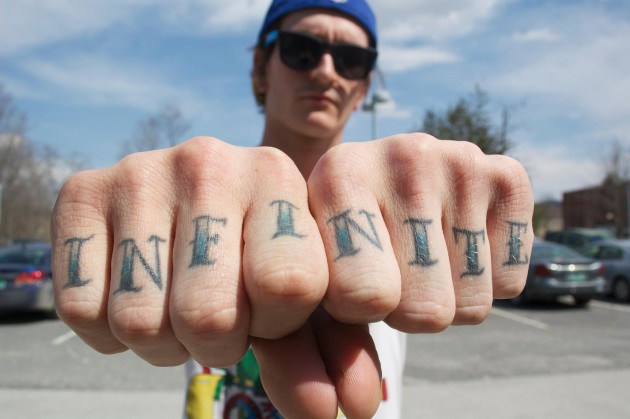The real price of ink

Tattoos are a way to express yourself, but could that expression you chose to make lead to missed job opportunities down the road?
Gerri Harrison, a longtime employee of Green Mountain Power Corp., works with professionals across the state of Vermont and said students need to be aware that is a possibility.
“I know that there are professional environments where obvious tattoos might be viewed as unprofessional or distracting, similar to how one dresses,” Harrison said when interviewed during last month’s career fair at Castleton State College.
About 23 percent of Americans have at least one tattoo, according to a new poll done by Pew Research Center. The Center also reports that after investigating the issue, it’s easy to say stigmas are often attached to people with tattoos.
Castleton alumni and former Spartan editor Megan Davis agrees with the poll.
“Despite my own experience telling me otherwise I do believe tattoos still has a stigma attached to them. I think if I were to ever try and get a job anywhere in corporate America, I may be denied because of them. At the very least, I would be forced to cover them up and hide them,” Davis said.
Julie Giles, of Vermont Custom Tattoo and Piercing in Burlington, said the tattoo business is bustling and even more so with women these days.
“Most girls seem to get at least three tattoos once they get the first one. It’s a bit addicting,” she said.
The most common places for tattoos these days are on ribs and wrists, she said.
Castleton students, professors and recent graduates who have tattoos offered different opinions on what those tattoos might mean to their future in the professional world.
Graduate Caitlin Briggs, working as a certified nursing assistant, has 12 different tattoos on her body from her legs to her neck.
“I have not had any problems working as a CNA. The things that really give me a problem are my facial piercings,” Briggs said.
Student Christian Procida said he isn’t worried about his body art and its impact on future employment.
“I got them in spots I can easily cover. Even if they were in spots I couldn’t cover, I think it’s ridiculous they are seen as unprofessional because of the fact it’s such a different generation,” Procida said.
Castleton’s Exercise Science program coordinator professor Justin Carlstrom is yet another tattooed individual walking around campus. In 2009 Carlstrom came for an interview on a 95-degree summer day.
Regardless of the heat, Carlstrom wore long sleeves to cover his tattoo sleeves so those interviewing him got to know him without making a judgment over his body art.
“When it comes to a job interview, cover them up,” Carlstrom said.
But Carlstrom also said it’s important to be proud of your tattoos.
“If you have a tattoo let it be seen. It costs you a lot of money and pain, it shouldn’t always be covered up,” he said.
Sean Collins, a business major, said he isn’t afraid to show his bicep art.
“I got the mountain tattoo when I was 20, it means a lot to me,” he said.
So despite the potential negativity of having tattoos, most of Castleton’s population is not afraid of what may happen with future employment.
“Tattoo culture has evolved into an art form, a form of expression. I and many other people throughout the world use our bodies as a canvas, and I don’t think there’s anything wrong with that,” said Davis.







